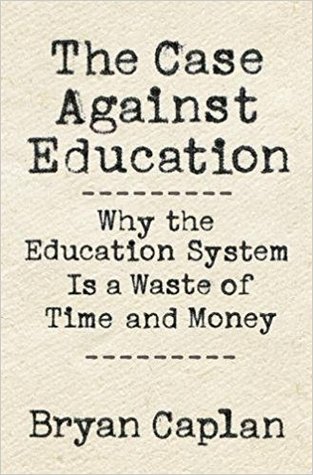
The book “The Case against Education” must come across as gospels to hundreds of thousands of students who are now suffering in the classroom, online or offline.
In the book, the author, Bryan Caplan, a professor in economics, lays down the claims against education: education is wasteful, education mainly serves as signalling rather than really teaching something useful to the students, education doesn’t have the impact like many of us would like to believe, and that the government should eliminate education funding or even tax students for going to school.
The less the education, the better.
Bryan Caplan makes these claims in the full knowledge of the irony: he himself is the main beneficiary of the “broken” system. Without government so extravagantly funding the education, his position as a professor in economics in a US public university would not have existed at all. But still, he feels that it’s his duty as an intellectual to speak out against this big white elephant in the room, for if he is not speaking up, other same-minded people but with none of the credentials certainly won’t or can’t.
On the face of it, the book really does sound controversial. Education is the path to end poverty, every government knows that and so every government is investing in it. Education is the path for the poor to become professionals and thus earn a decent living wage, it’s a ticket for them to move into middle class. Who says education is useless?
But then, you can’t judge the book by its cover. You have to read the whole book to understand what is really being discussed about.
Bryan Caplan doesn’t deny that education is useful for individuals, you owe your middle class life to your education, no one can dispute that. But what he argues is, education is generally wasteful for the society as a whole. When everyone gets a degree, a degree becomes useless. So you differentiate yourself by getting a master degree, and everyone does the same… It’s just like a rat race with no visible improvement for everyone.
But what about the knowledge you gain in the classroom? Aren’t they useful? Isn’t a master holder more educated than a degree holder, and hence more productive as far as the society is concerned? And that’s precisely Bryan’s point: most of the courses are disconnected from the real world and they are useless beyond passing the exams. Think mathematics, you learn calculus, discrete math and trigonometry in your engineering class, how much of them you are expected to make use of in your work or life? 10% or less, that’s already an optimistic estimation.
It’s not to say that a degree is completely useless, education does teach some important skills and knowledge, only that this contribution is greatly exaggerated.
The value of education mainly lies in signalling– to tell the employee that you are fit for employment because you have the intelligence, conformity and grit to go through a boring and impractical four year course. So much for the thought that the education makes you knowledgeable and thus makes you employable. It’s more like it just merely certifies for the employable qualities in you, for which you might already have, even without education.
Wait!I hear you interject: schools are not meant to teach you practical skills, they are meant to make you a better person, they cultivate your thought, inspire your curiosity, sharpen your analytical skills and teach you to think for yourself, lest you got brainwashed by dictators. An educated population has a less chance of being manipulated , makes better citizen and generally have richer inner lives.
But the problem is, as Bryan points out, the education that we have is failing miserably on this front. Education is proven to have very little or no effect on people’s gullibility, doesn’t really inspire admiration for high culture even though your English teachers are trying very hard to drill Shakespeare into your brain. Most professors in the US are politically left leaning, but students political orientation hardly changes after graduating university ( and of course, 4 years ago they collectively elected Donald Trump). Students are proven to have very little ability to apply the skills across domain; eg: most of them simply don’t know how to apply statistical techniques they learn in hard science on their daily lives.
So the claim that education makes you a better person doesn’t really stand up to scrutiny, at least not for the majority of the population.
Education is mostly about certification and signalling, not really education per se.
If that’s the case, what should you do, and what should the government do? They are two different thing.
As an individual, since education is still an important means to get forward ( signalling or no), you still need to get an education, lest you get left out of the rat race. So this book is not a license for students to slack off and not bother trying schools. So no, this book is not really a gospel for the long suffering students.
But for the government, there are things that government can do. Bryan suggests government to simply cut funding for conventional education, however politically incorrect that may sound. Why sponsor wasteful programme? The money can be put to better use: such as to fund vocational schools; since most students aren’t really interested in Ludwig Wittgenstein , Bertrand Russell, David Hume and all the philosophies, and neither they are really interested in calculus,boolean logic, Maxwell electromagnetism and quantum theories, why not just let them learn practical stuffs, like fixing automobile, art of plumbing and baking cakes? They become better and more accomplished foreman, plumber and cake bakers, instead of failed philosophers and mathematicians. From who can the society benefit more, a failed mathematician, or a more accomplished cake bakers?
If you are a policy maker, you need to read this book so that you can allocate the resources better. If you are a student, you also need to read this provocative book, not to use this book as an excuse not to study because the “whole system is corrupted” ( you still need to play by this “corrupted system” if you want to get ahead in life), but because you need to know how the society works.








